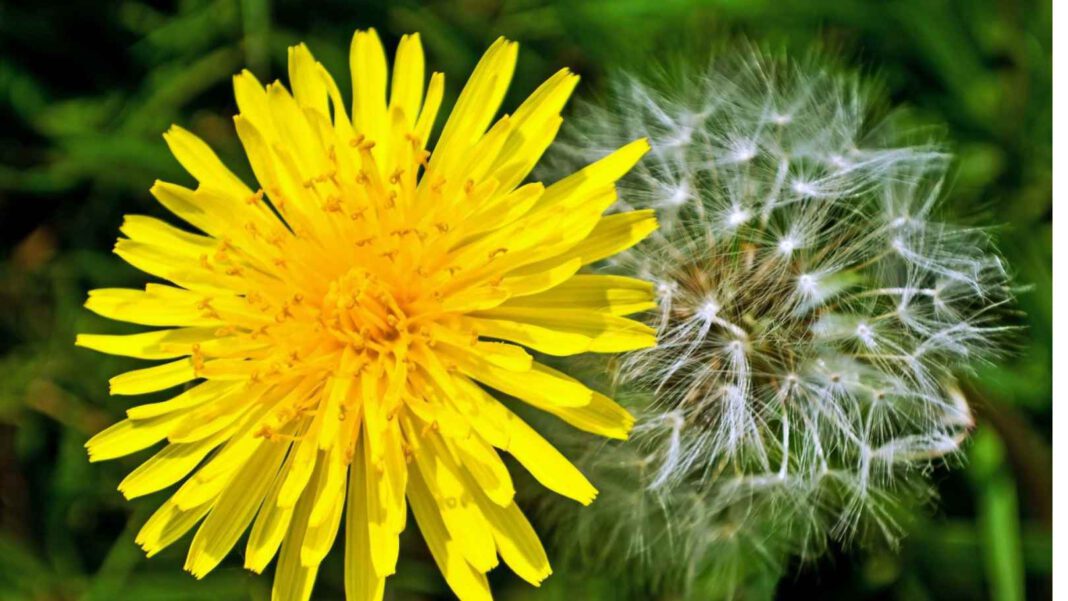Health-promoting properties of dandelion
Contents:
Dandelions, which grow along roadsides, in meadows, and pastures, are familiar to all of us. However, not all of us know that dandelions, or the dandelion plant, are a valued herb in herbal medicine and have a wide range of uses. They are often mistaken for sow thistle, which is a weed and lacks any health-promoting properties. So let's take a look at how dandelions work and how to distinguish them from sow thistle.
Dandelion and sow thistle
At first glance, both plants appear almost identical, but there are some characteristic differences that help us distinguish them. Sow thistle has only one thick stem covered with leaves that divides into lateral shoots, while dandelion has multiple stems growing from a single root system. The stem, which bears only one inflorescence, is leafless. The leaves are arranged in a rosette and grow independently of each other. At the time of flowering, the plant transforms into a dandelion.
Properties of dandelion
The dandelion is a perennial herb in the daisy family (Asteraceae). It grows most commonly in the wild along roads, in meadows, and in thickets throughout Europe, Asia, and both Americas. The entire plant is used for medicinal purposes – the roots are harvested in the fall, washed, the above-ground parts removed, and dried naturally or in a special, heated drying room. In the spring, however, the stems, leaves, and flowers—the entire above-ground part—are collected and dried in the shade. The entire plant, used in herbal medicine, is a source of:
- bitter sesquiterpene compounds,
- Triterpene,
- phytosterols,
- Inulin,
- Phenolic acids,
- potassium salt,
- Triterpene compounds , _
- flavonoids,
- Carotenoids,
- Apigenin and luteolin derivatives,
- Magnesium , potassium and silicon compounds.
The healing properties of dandelion are diverse. It works:
- Diuretic – it is recommended for use in cases of edema, gout, kidney disease, or to combat obesity. It has a detoxifying effect on the body,
- Antidiabetic – contains inulin, which helps regulate carbohydrate metabolism, slows down sugar absorption, and also helps lower the glycemic index of foods.
- Supports the digestive process – increases the secretion of gastric juice and bile, prevents bile stasis and is especially recommended for the prevention of gallstones and the treatment of liver diseases.
- Support of the immune system – recommended during convalescence, in the elderly and in cases of increased incidence of viral diseases,
- supports the slimming process – the inulin contained in dandelion reduces the feeling of appetite,
- regulates the work of the ovaries – thanks to the content of flavonoids and folic acid, it contributes to the regulation of the menstrual cycle.
Contraindications to the use of dandelion
Dandelion preparations can be consumed in various forms, such as syrup, flower infusion, dried leaf tea, or dandelion extract in the form of a dietary supplement. Contraindications to the use of dandelion preparations include pregnancy and breastfeeding, as well as diseases such as:
- Gallbladder empyema,
- Blockage of the bile ducts,
- Intestinal obstruction.
THE PUBLISHER'S CHOICE
Dried plums 1 kg BIOGO
- €7,01
- €7,01
- Unit price
- / per
Dried White Mulberries 500 g ORGANIC
- €5,84
- €5,84
- Unit price
- / per
Almonds 1 kg BIOGO
- €11,69
- €11,69
- Unit price
- / per
Cranberries sweetened with apple juice organic 1 kg BIOGO
- €16,37
- €16,37
- Unit price
- / per
Dried dates 1 kg BIOGO
- €4,21
- €4,21
- Unit price
- / per
Unpeeled buckwheat groats 1 kg BIOGO
- €2,81
- €2,81
- Unit price
- / per
Walnuts 800 g BIOGO
- €8,65
- €8,65
- Unit price
- / per
Peeled sunflower seeds 1 kg BIOGO
- €3,04
- €3,04
- Unit price
- / per
PULLED ORGANIC SUNFLOWER SEEDS 1 KG BIOGO
- €4,44
- €4,44
- Unit price
- / per












































































































































